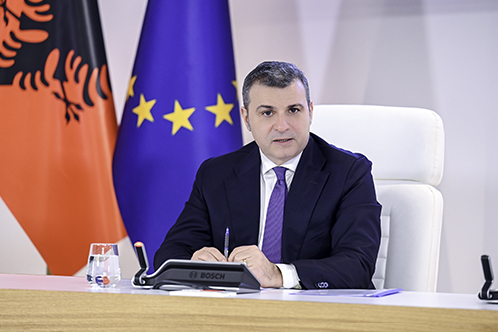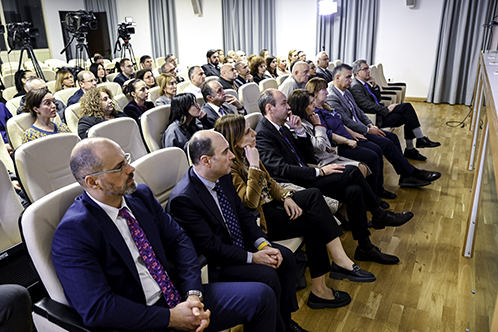BANK OF ALBANIA
PRESS RELEASE
Governor Sejko: Statement to the press conference on Monetary Policy Decision, 5 February 2025
Publication date: 05.02.2025
Dear Ladies and Gentlemen,
Today, on 5 February 2025, the Supervisory Council of the Bank of Albania reviewed and approved the Quarterly Monetary Policy Report.

The information analysed in this Report suggests the Albanian economy has been on a positive track over 2024. Economic activity, employment and wages expanded at a stable pace, inflation has been declining and remained at low rates, while economic and financial stability indicators improved. This performance was reflected in the increase of Albanian households’ income and consumption, the preservation of the purchasing power of their income and savings, as well as in the expansion of businesses’ investments and the maintenance of the financial soundness of their balance sheets.

Our monetary policy has provided an important positive contribution in these developments. The prudential and proactive approach to the ongoing challenges we have faced has enabled keeping inflation under control without jeopardising the positive trend of economic growth and its financial stability. Also, this approach has guaranteed a stable financial environment and a rapid expansion of credit, in turn establishing the foundations for a sound economic growth in both medium and long term.

The outlook for future economic developments remains positive. The Albanian economy is expected to grow at a stable pace in the medium term, while inflation will return to our 3% target during 2025.
Against this backdrop, the Supervisory Council deemed that the current monetary policy stance is still adequate to guarantee price stability and support the sustainable development of the economy.
[Below, I will outline today's decision and explain in more detail the rationale behind it.]
***
The consumer price inflation stood at 2.0%, unchanged in the fourth quarter of 2024. Performance of food and oil prices in international markets on the opposite side has mainly dictated inflation fluctuations in the last months, likewise in the previous quarters. In particular, the surge in these prices over the last two months was reflected in a slight increase in inflation.
In 2024, inflation stood at 2.2%, from 4.8 % in the previous year. Its fall was relatively broad-base, but more pronounced in food prices, which pursed a declining trend for most of year, reflecting similar developments in international markets.
From the macroeconomic perspective, inflation fell over 2024, as inflation in trading partners was down, lek exchange rate strengthened, and in reflection of our monetary policy effects. The latter has contributed in: a better supply and demand balance in the economy; the control of risk premium; and the stability of monetary and financial markets. As a result, pressures from domestic economy have been reduced, bringing them closer to levels suitable for archiving inflation target in the medium term.
According to INSTAT data, the Albanian economy grew by 4.1% in the third quarter of 2024. Expansion in economic activity reflected the rise in consumption and investments, as well as the increase in tourism exports, while the export of goods declined and fiscal policy continued the consolidation trend. This demand profile was reflected in the increase of the activity in the sectors of construction and services, while industry and agriculture sectors were down. Available data suggest a similar performance and profile in the fourth quarter as well.
Economic growth has been accompanied by an increase in employment, wages, and business sales volume, generating more income for Albanian businesses and households. At the same time, low inflation levels have affected the elevated purchasing power of these incomes and have incentivized private sector’s investments.
Alongside these factors, the sound balance sheets of the private sector, consumer and business confidence in the future, as well as the stimulating financial environment have underpinned the expansion of activity.
The financial environment has reflected the prudential monetary policy and low risk premiums. The monetary easing undertaken in the past year has accommodated the fall of interest rates in all segments of market. In particular, interest rates on loans have benefited from low risk premiums and a positive approach from banks towards lending to households and businesses. Also, the exchange rate has experienced a slower appreciation over the past two months, thus further improving the financing conditions.
The favourable financial environment and the high demand have sustained the rapid growth of credit over 2024. Credit to private sector grew by 15.8% in the fourth quarter, bringing the annual average credit growth to 14.4%. The credit expansion continued to be broadly-based, meeting the needs of enterprises and households, for investments, consumption and working capital. At the same time, the credit portfolio continues to maintain good quality, as evidenced by the low levels of non-performing loans ratio, and a foreign currency structure oriented towards the lek.
Economic outlook remains positive. Economic activity in Albania is expected to continue growing over the medium-term horizon, fuelled by the further expansion in consumption, investments and tourism export. In parallel, employment and wages are expected to tick up, in turn boosting the welfare of households. Economic growth is expected to remain stable and close to potential, in turn enabling a domestic inflationary pressures level in line with the target.
Inflation is expected to converge towards the 3% target by 2025. Price stabilisation in international market and a more stable exchange rate will support the performance of inflation. On the other hand, domestic pressures are expected to remain stable, as a result of the sound growth of the economy and the anchored expectations for inflation. The lowering of electricity prices for households with consumption up to 700 kWh is expected to affect the reduction of inflation over 2025.
Balance of risks for the future appears neutral for the moment. However, uncertainties surrounding economic forecasts have strengthened, mainly due to developments in the external environment. The continuation of geopolitical tensions and uncertainty regarding trade and economic policies could generate significant implications for the global economy in general and the European economy in particular.
***
Taking into account these circumstances, the Supervisory Council decided to:
- Keep the policy rate unchanged, at 2.75%;
- Keep the interest rate on overnight deposit unchanged, at 1.75%;
- Keep the interest rate on overnight lending facility unchanged, at 3.75%.
The Supervisory Council judges that the current monetary policy stance is adequate for meeting our price stability objective in the future.
Also, the Supervisory Council evidenced that the overall balance of medium-term pressures is gradually approaching to our inflation target. In this context, the next monetary policy decisions will continue to be depended on new information, and particularly on the analyses and assessments about the performance of the domestic inflationary pressures. These decisions will always be congruent with our price stability objective, consistent with the fiscal policy stance and the performance of the exchange rate.

 Linkedin
Linkedin
 Twitter
Twitter
 Facebook
Facebook
 Instagram
Instagram
 Flickr
Flickr
 RSS
RSS
 Subscribe
Subscribe
 Feedback
Feedback